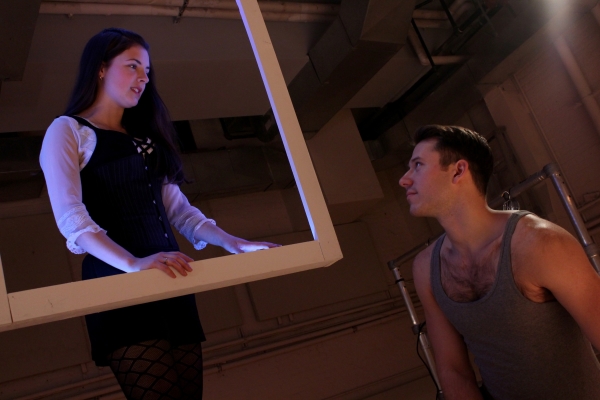Shakespeare in the Square's Romeo and Juliet
A youthful rendition of the classic romance gets a breakneck revival at the Gym at Judson.

(© Erik Choquette)
One of the things that Shakespeare in the Square's production of Romeo and Juliet promises is a two-hour running time. Shakespeare does, after all, mention "two hours' traffic" in the play's sonnet-shaped prologue (which in this staging, incidentally, is omitted). The five young, highly talented members of the cast now performing the classic tragedy at the Gym at Judson do their darnedest to hold Shakespeare to his word, whether he meant it literally or not. The result, however, while full of zest and humor, feels a bit too rushed and devoid of emotional intensity.
Shakespeare in the Square prides itself on using some of the theatrical conventions of Shakespeare's time, such as all-male casts and interaction with the audience. In this production, one woman, Elise Kibler (soon to make her Broadway debut in The Heidi Chronicles), has signed on to play Juliet, the star-crossed lover of Romeo (Taylor Myers). Their families, the Montagues and Capulets, have been feuding for years in fair Verona. Yet when the two teenagers meet at a Capulet party, they immediately fall in love and are soon married by Friar Lawrence (Jack De Sanz). Enmity builds between the families' young, rivalrous hotheads, Tybalt (Chris Dooly) and Romeo's friend Mercutio (Constantine Malahias). Tybalt kills Mercutio in a duel, and consequently, enraged Romeo kills Tybalt to avenge Mercutio's murder, and gets himself banished in the process. A series of miscommunications eventually lead Romeo to believe Juliet is dead, and in despair he kills himself. Juliet, finding Romeo's body, then takes her own life, and the Montagues and Capulets are forced to bear the tragic outcome of their senseless, long-standing hatred.
To focus on the play's language, director Dan Hasse gives us a stripped-down set (designed by Phil Falino), comprising risers with scaffolding behind. The five actors, all of whom play multiple parts, dress in everyday clothing (Romeo wears a tank top), but minor costume additions (by Liz McGlone) allow for lightning-fast costume (and character) changes. And a three-member band (Kieran Conaway on guitar, Caroline Aimetti on cello, and Christopher Brown on drums) provides music during the party episode and at various times during the show. All of this gives the play a welcoming, informal feel as the scenes whiz from one to the next.
The speed with which Kibler and Myers sometimes reel off their lines, however, often wipes out any chance of them creating onstage chemistry. The "balcony scene," delivered in near darkness with Romeo speaking from the shadows (inventive lighting design by Timothy Meola), feels bereft of the passion of first love.
That's a big loss, but Myers (in a corset) shines as Lady Capulet, and Kibler shows broad range as Benvolio, and even Friar John. De Sanz has excellent comic timing as the Nurse and Friar Lawrence, and Dooly gives us a convincingly angry Tybalt. The show's most impressive performance, though, belongs to Malahias, who delves deep into the play's language and pulls out subtle cues, gestures, and verbal nuances in his outstanding Mercutio and Lord Capulet. His delicate shadings of character are a sheer delight to watch.
In the end, the production misses its two-hour running-time goal by about a half hour or more. To be fair, it's hard to clock any Shakespeare play in at that time without significant cutting. Still, the folks of Shakespeare in the Square deserve some credit for trying, but it's important to remember that you can't hurry love.







